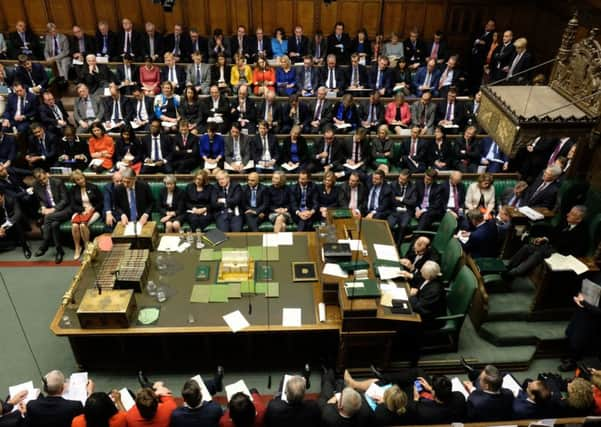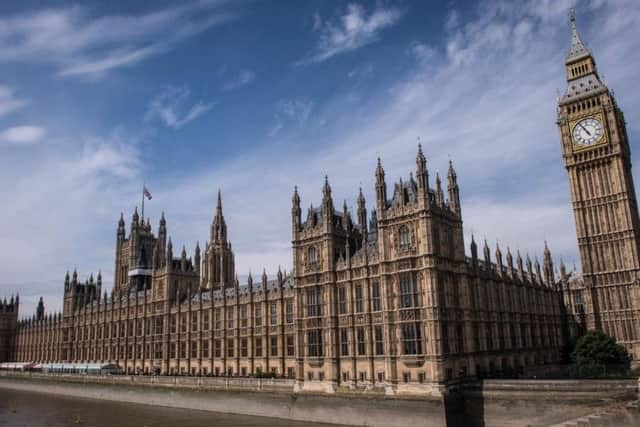Which Yorkshire MPs spoke up for voters - and who stayed silent in 2017?


They are paid to be your voice in Parliament – but it seems that many of them have lost their own.
A new analysis of parliamentary performance by The Yorkshire Post has revealed the county’s quietest and loudest MPs – and there are some surprises.
Advertisement
Hide AdAdvertisement
Hide AdThe findings, based on data from the TheyWorkForYou website, compared the number of times every MP has spoken in debates, received written answers to questions and voted in House of Commons votes in the past 12 months.


Of the current 54 elected Yorkshire MPs, Skipton and Ripon MP Julian Smith scored the lowest possible – zero – on two of the three indicators.
The Conservative MP – who was promoted to Government Chief Whip in November – hasn’t taken part in a single debate in Parliament over the past year, and has not submitted any questions to Ministers for written answers.
Also scoring a zero on performance in debates – and one of the lowest overall aggregates – was controversial Sheffield Hallam MP Jared O’Mara, who toppled Nick Clegg in June’s snap General Election but is currently suspended by the Labour party and serving as an independent.
Advertisement
Hide AdAdvertisement
Hide AdHe has voted in only a third of parliamentary votes, but asked 41 questions in the six months since he was elected.


The TheyWorkForYou statistics showed that Huddersfield’s Barry Sheerman was the most vocal in terms of debates alone, speaking in 131 debates in the past 12 months.
Mr Sheerman also scored highly on written questions (152), making him overall one of the most vocal MPs in the county.
Hemsworth MP Jon Trickett has spoken in just seven debates over the past year – making him the fourth-quietest MP from the region in this category.
Advertisement
Hide AdAdvertisement
Hide AdBut with four times as many written questions (1,603) to his name as his nearest colleague, Mr Trickett can still claim to be one of the most vocal constituency politicians in the country.
Also making an appearance on the ‘quiet’ list was Morley and Outwood Conservative MP Andrea Jenkyns.
However, her low participation both in debates (eight) and votes (20 per cent) is explained by the fact that she was on maternity leave last year.
In North East Leeds meanwhile, Labour’s Fabian Hamilton, who serves as Shadow Minister for Peace and Disarmament, scored among the lowest for debates spoken in (11) but had one of the highest turnouts for major votes (90 per cent).
Advertisement
Hide AdAdvertisement
Hide AdAnd in Pudsey, Conservative MP and assistant Government whip Stuart Andrew scored low in the number of debates spoken in (eight) the joint fifth-lowest with his Conservative colleague Andrea Jenkyns.
However, his voting turnout was the second-highest at 95 per cent, alongside Shipley MP Philip Davies and Thirsk and Malton member Kevin Hollinrake.
In terms of written questions alone, Brexit Minister and Haltemprice and Howden MP David Davis scored a zero, as did deputy speaker Rosie Winterton (Lab, Doncaster Central); Treasury whip Graham Stuart (Con, Beverly and Holderness); Children’s Minister and Scarborough MP Robert Goodwill; and Pontefract’s Labour MP – and select committee chair – Yvette Cooper.
The Yorkshire Post findings have led to one political analyst now calling for greater transparency about the multiple roles and responsibilities held by MPs and a cleaning-up of our “not perfect” parliamentary system which, it is claimed, fails to reflect accurately the amount and variety of work MPs do.
Advertisement
Hide AdAdvertisement
Hide AdObservers say the overall figures are skewed by the fact that MPs who hold Cabinet and Shadow Cabinet posts, as well as Whips, the Speaker and Deputy Speakers and a number of other high-profile positions such as select committee chairs, are restricted from taking part in many votes or debates. It is pointed out that in other countries, senior politicians do not have a simultaneous constituency role.
Dr Ruth Fox, from the Hansard Society, said: “Speaking or asking questions in the House of Commons is just one aspect of an MP’s complex role and is heavily dependent on their position in the House. For example, if they get a frontbench job, a Minister or their equivalent in the official opposition can’t just take part in any debate that interests them, only those that concern their policy brief.
“Backbench MPs can represent their constituents directly by speaking in the chamber or asking questions; but frontbenchers can do so behind the scenes – and often more influentially – through meetings or correspondence with Ministers.
“In other political systems, Ministers are often much more distant from the people affected by their policies because they are not in Parliament and do not have a constituency to represent.
Advertisement
Hide AdAdvertisement
Hide Ad“In our system, MPs are the pool from which Ministers and their opposite numbers are drawn.
“The rules and procedures that support this are not perfect but they maintain the constituency link between Ministers and the people they serve.
“But it does mean that MPs have multiple roles and responsibilities. Parliament couldn’t function without MPs performing a range of roles – such as party leader, Minister or Whip, opposition spokesperson, select committee chair or Deputy Speaker.
“Where the House of Commons could help itself is by being much clearer about the particular responsibilities some MPs may have that affect their participation records so that when data like this is published it is much easier for people to understand why there are significant differences between them.”
Advertisement
Hide AdAdvertisement
Hide AdMany Yorkshire MPs today defended their parliamentary performance as revealed in the TheyWorkForYou statistics.
Hemsworth MP Jon Trickett explained that his role as shadow minister for the Cabinet Office means his job is essentially “preparing Labour for Government”.
As the department is not one of those that is subject to many debates, he is not able to partake in many of them, according to parliamentary rules.
However he stressed that he and other MPs work extremely hard in their constituencies, and he has an “open door policy” and 330 live cases at the moment.
Advertisement
Hide AdAdvertisement
Hide Ad“When you are wanting to project ideas there are other ways to do it,” he said of his proclivity for submitting written questions instead.
However he stressed it was “not a competition”.
Meanwhile Skipton MP Julian Smith said there was “long-standing convention Whips do not submit oral or written questions”.
“This is set out in various widely-used guides to parliamentary procedure, both implicitly and explicitly,” he said.
Andrea Jenkyns said: “Due to being on maternity leave in the constituency some of my participation statistics in Westminster are not where I would like them to be, but because of my circumstances I made the decision to place more of an emphasis on my crucial constituency work, which can help people when they are at their most vulnerable.
Advertisement
Hide AdAdvertisement
Hide Ad“This year I have still worked with hundreds of constituents on 1,403 cases.
“I have also made sure I attend vital Brexit votes, such as triggering Article 50 and passing the European Union (Notification of Withdrawal) Bill in Parliament.”
Leeds North East MP Fabian Hamilton said: “Modern politics is not just about making speeches in the House of Commons - it is about casework and engaging with your local constituency and local people at home.
“This is why I, with the help of my office, have dealt with thousands of cases in Leeds North East this year.”